Arnolde Surname Ancestry ResultsOur indexes 1000-1999 include entries for the spelling 'arnolde'. In the period you have requested, we have the following 21 records (displaying 1 to 10): Buy all | | | Get all 21 records to view, to save and print for £98.00 |
These sample scans are from the original record. You will get scans of the full pages or articles where the surname you searched for has been found. Your web browser may prevent the sample windows from opening; in this case please change your browser settings to allow pop-up windows from this site. The English in France
(1428)
King Henry VI of England (one of the grandsons of Charles VI of France) claimed the throne of France (and quartered the fleurs-de-lis of France with the lions of England on the royal standard) as had his predecessors since Edward III, as descendants of Philip IV of France. The English had real power or influence in Brittany, Normandy, Flanders and Gascony, and actual possession of several coastal garrisons, in particular Calais, where the French inhabitants had been replaced by English. Henry VI came to the throne only seven years after his father had trounced the French at Agincourt; but his cousin, Charles VII, who became king of France in the same year, spent his long reign rebutting the English king's claim to his throne by territorial reconquest and consolidation. The English administration kept a series of records called the French Rolls. On these are recorded royal appointments and commissions in France; letters of protection and safe-conduct to soldiers, merchants, diplomats and pilgrims travelling to France from England and returning, and to foreign legations. There are also licences to merchants to export to the Continent, and to captains to transport pilgrims. As Henry VI's reign progressed, and the English grip on northern France loosened, the French Rolls also increasingly include entries concerning the ransoming of English prisoners.ARNOLDE. Cost: £6.00.  | Sample scan, click to enlarge
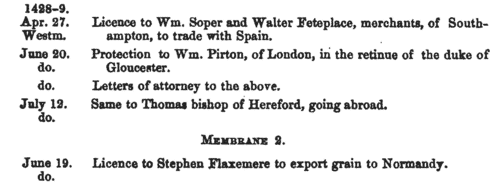
| Close Rolls
(1429-1435)
The close rolls of the 8th to 13th years of the reign of king Henry VI record the main artery of government administration in England, the orders sent out day by day to individual officers, especially sheriffs of shires: they are an exceptionally rich source for so early a period. There is also some material relating to Wales, Scotland, Ireland and the English possessions in France. Also included is the Exchange Roll of 1424 to 1434, of licences to transmit sums of money out of the realm.ARNOLDE. Cost: £4.00.  | Sample scan, click to enlarge

| Close Rolls
(1441-1447)
The close rolls of the 20th to 25th years of the reign of king Henry VI record the main artery of government administration in England, the orders sent out day by day to individual officers, especially sheriffs of shires: they are an exceptionally rich source for so early a period. There is also some material relating to Wales, Scotland, Ireland and the English possessions in France. ARNOLDE. Cost: £4.00.  | Sample scan, click to enlarge

| Dublin diocese testators and legatees
(1457-1483)
This register of testaments or wills and inventories from the diocese of Dublin in the time of archbishops Tregury and Walton (now in the Library of Trinity College, Dublin) was printed with a translation by the Royal Society of Antiquaries of Ireland in 1896-7. The inventory usually comes first, and often includes names of debtors and creditors to the testator. The diocese of Dublin did not extend far into the Pale; but the province of Dublin, over which the archbishops had prerogative probate jurisdiction, included the southern half of Ireland, but virtually all these wills are from the city of Dublin or close at hand.ARNOLDE. Cost: £4.00.  | Sample scan, click to enlarge
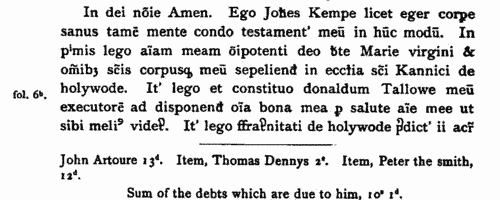
| Lichfield Diocese Ordinations: Deacons Secular (1510)
The diocese of Coventry and Lichfield at this period included the whole of Cheshire, Staffordshire and Derbyshire; all Lancashire south of the Ribble; northern Shropshire (including Shrewsbury); and northern Warwickshire (including Birmingham and Coventry). Ordinations took place on the four Ember Saturdays in the year, and on certain other occasions; lists of ordinands to the degrees of acolyte, subdeacon, deacon and priest were preserved in the ordination registers, a distinction being made between those clerks who were 'regular', i.e., monks, friars, &c., and those who were 'secular', the main body of the clergy. All ordinands were celibate, and those regular, and the secular who obtained benefices, remained so, but only a minority of the secular ordinands ever obtained benefices, and most will doubtless have married later in life. No man might be ordained to subdeacon or higher without proving either that he was of independent means or that he was sponsored by an institution or a gentleman. Most entries in the register of such ordinations therefore have the words 'ad titulum' followed by the name of the religious house that was the sponsor. This is an important indication of the man's origins - boys whose families were monastic tenants, and who were educated by the monks, would naturally be sponsored by the abbey. Only men who were born and bred in the diocese could be ordained by the bishop, unless producing letters dimissory from the bishop of the diocese of their birth. These are the ordinations celebrated on Ember Saturday, 21 December 1510, by Thomas Panados (Pavados) suffragan of bishop Geoffrey Blythe, in Lichfield cathedral.
ARNOLDE. Cost: £8.00.  | Sample scan, click to enlarge

| Suffolk Charters
(1520-1529)
A large accumulation of documents preserved in the Bodleian Library, Oxford, formerly constituted the antiquarian collections of Anthony a Wood, Roger Dodsworth, Ralph Thoresby, Thomas Martin of Palgrave, Thomas Tanner bishop of St Asaph, Dr Richard Rawlinson, Richard Furney archdeacon of Surrey, and Richard Gough. A calendar of these was prepared by William H. Turner and published in 1878 under the title 'Calendar of Charters and Rolls preserved in the Bodleian Library'. The word 'charters' is here used in a rather loose sense, including virtually any manuscript or copy of a manuscript, but the bulk of the contents consists of mediaeval deeds of conveyance. Turner's calendar deals with each briefly, naming the principal parties and the nature of the deed, but hardly ever lists the witnesses. Many of these charters were undated (dating of deeds did not become general until around 1350) or so damaged or defective ('mutilated' is Turner's usual description) as no longer to display a legible date. However, he contrived, from the style of the script and/or the nature of the contents, to estimate dates in such cases. The sample scan is from the start of the Bedfordshire list. ARNOLDE. Cost: £4.00.  | Sample scan, click to enlarge
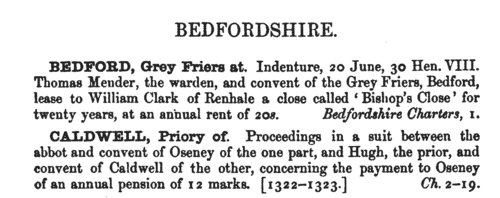
| Liegemen and Traitors, Pirates and Spies
(1542-1547)
The Privy Council of Henry VIII was responsible for internal security in England and Wales, and dealt with all manner of special and urgent matters
ARNOLDE. Cost: £4.00.  | Sample scan, click to enlarge

| Churchwardens and other parishioners in Buckinghamshire
(1552)
In accordance with a royal commission of 16 May 1552, inventories were taken of the valuables held by individual parishes throughout England. These records survived in the Public Record Office, and were transcribed by the Reverend J. E. Brown, vicar of Studham, edited for the Alcuin Club by F. C. Eeles, and published in 1908. Some additional material from Additional MS 34,741 and Lansdowne MS 1045, in the British Museum, was incorporated. The people whose names appear in these records are mostly the churchwardens and those respectable parishioners to whose custody some of the valuables had been entrusted.ARNOLDE. Cost: £4.00.  | Sample scan, click to enlarge
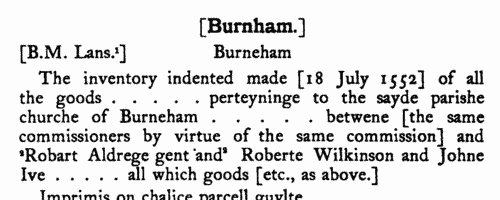
| Officers of the Royal Household
(1553)
King Edward VI died 6 July 1553 and was buried 8 August following. The accounts of the funeral expenses were prepared by sir Edward Waldegrave, knight, one of queen Mary's privy coucil, and master of her Majesty's great wardrobe. The expenses included the purchase of 'blacke clothe boughte for the buriall' to furnish mourning for every officer and servant of the late king's household, and these accounts list all the officers, department by department, by name. Most officers were provided with 4 yards of cloth, and their clerks and servants 3 yards each: greater dignitaries were allowed from 7 to 16 yards; sir Edward himself received 10. The total cost of the 9,376 and a half yards of cloth was £5946 9s 9d.ARNOLDE. Cost: £6.00.  | Sample scan, click to enlarge
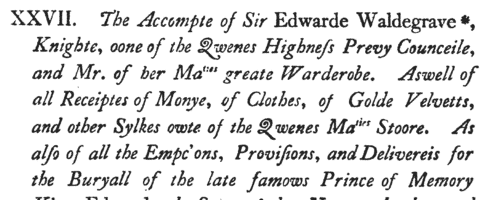
| Liegemen and Traitors, Pirates and Spies
(1552-1554)
The Privy Council of Edward VI and queen Mary was responsible for internal security in England and Wales, and dealt with all manner of special and urgent matters
ARNOLDE. Cost: £4.00.  | Sample scan, click to enlarge

|
Research your ancestry, family history, genealogy and one-name study by direct access to original records and archives indexed by surname.
|












